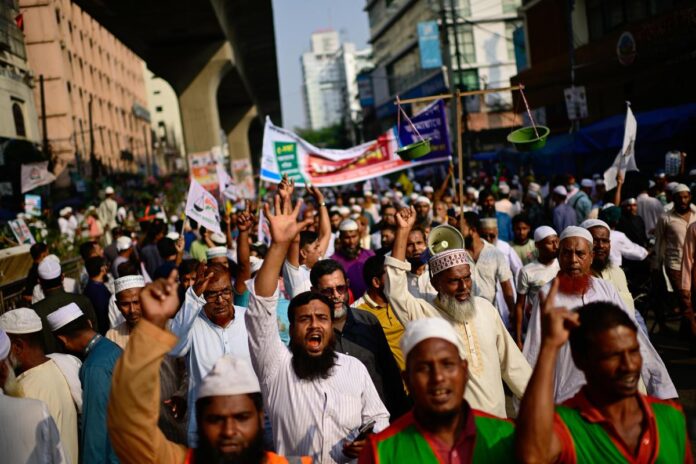Unrest has gripped Bangladesh ahead of a crucial court verdict in the trial of former Prime Minister Sheikh Hasina, with the interim government led by Muhammad Yunus accusing India of giving her a platform to attack Dhaka while she remains in exile.
On Wednesday, Bangladesh’s Foreign Ministry summoned India’s Deputy High Commissioner in Dhaka to protest Hasina’s recent media interviews from India. The ministry reportedly told the envoy that allowing a “notorious fugitive” to “spew hatred and advocate terrorist acts inside Bangladesh” was damaging to bilateral ties, according to state news agency Bangladesh Sangbad Sangstha (BSS).
Hasina, who fled to India after her government was toppled in August 2024, recently spoke to several international and Indian outlets for the first time since her ouster. A special tribunal in Dhaka has announced that the verdict in her trial for alleged crimes against humanity will be delivered on November 17.
In her interviews, Hasina said she would “love to return to Bangladesh” if elections were “free, fair and participatory.” She told the New Indian Express that her party, the Awami League, would “surely participate” in future polls if allowed.
The former leader also accepted her administration’s “leadership responsibility” for the deaths of thousands during the mass protests between July and August 2024, which ended her 15-year rule.
Speaking to PTI, Hasina accused the unelected Yunus administration of “endangering ties with India and empowering extremist forces.” She said the “broad and deep” relationship between Dhaka and New Delhi should withstand the “foolhardiness of the Yunus interlude,” and expressed gratitude to India for providing her refuge.
Hasina dismissed claims that the United States supported efforts to remove her from power, telling News18 there was “no reason to believe” Washington or other foreign governments were involved in Bangladesh’s political crisis.
The Awami League, now banned, has called for a nationwide “lockdown” to protest her trial, sparking fresh violence in Dhaka and other cities. Over the past three days, crude bombs and arson attacks have been reported, including a train and a bus set on fire in the capital. Schools have shifted to online classes, and public transport remains disrupted as authorities deploy heavy security across the country.
The Awami League denied involvement in the violence, accusing the interim government of staging incidents to “undermine the success of this democratic movement.” Its Dhaka office was also torched this week, a repeat of similar attacks that followed Hasina’s ouster last year.
The government has deployed around 17,000 police officers, along with Border Guard Bangladesh units, to maintain order. Access to the state guest house Jamuna, the residence of Chief Adviser Muhammad Yunus, has been restricted.
Hasina and two others, former Home Minister Asaduzzaman Khan and ex-Inspector General of Police Chowdhury Abdullah Al-Mamun, are being tried by the International Crimes Tribunal for alleged atrocities during last year’s protests. Mamun has turned state witness, while Hasina and Khan remain fugitives.
Chief Prosecutor Tajul Islam has sought the death penalty for Hasina and Khan, calling their actions “crimes against humanity.” The tribunal formally indicted the trio on July 10, and the trial has been broadcast live on state television. The verdict is expected on November 17.

